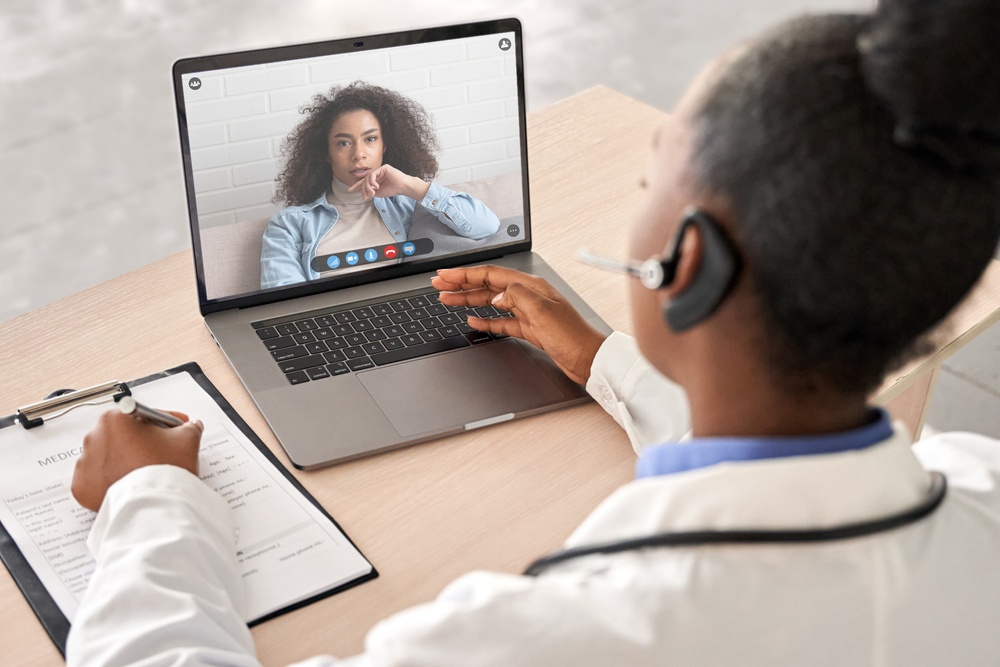Online Addiction Treatment: Pros and Cons of Teletherapy
Addiction counseling and recovery education are critical to maintaining long-term sobriety, but traveling to multiple treatment sessions weekly isn’t always ideal. That’s where telehealth services come in.

What is Teletherapy for Addiction Treatment?
Telehealth is an outpatient option for receiving medical/ health services remotely, rather than in-person. Teletherapy refers to telehealth behavioral and mental health services, including drug and alcohol counseling, that are delivered remotely, most often through an online computer video connection or over the phone.
Email and text messages may be used as well, especially when the therapist and client need to communicate between sessions. Teletherapy apps that offer multiple services, such as therapy sessions, appointment setting services, and prescriber services for medication refill requests, all in one place, are becoming more commonly used.
Oftentimes, substance abuse goes hand-in-hand with other mental health issues – referred to as co-occurring mental disorders. Telehealth services are making therapy for dual diagnosis more accessible than ever. You can now connect with a therapist via secure video visits or even phone calls, all HIPAA compliant to protect your privacy. Therapies used can include cognitive behavioral therapy (CBT), dialectical behavioral therapy (DBT), trauma informed therapy, motivational interviewing, and more.
Therapists can also prescribe medication, if needed, to address specific health issues related to your substance abuse. The ultimate goal is to empower you with the tools for personal growth and long-term recovery.

Pros and Cons of Online Drug Rehab
Receiving drug rehab treatment online has many benefits and a few disadvantages.
Pros
- Increased availability of services, even in traditionally service-shortage areas, such as rural communities. With teletherapy, there are likely to be more service providers to choose from.
- Convenience: With teletherapy, you don’t have to leave your home, so transportation, travel time, and the possible need to find childcare are eliminated.
- Flexibility: Especially if you are using a teletherapy app program, you may be able to schedule sessions at odd times, such as during late evening or nighttime hours.
- Cost savings: Telehealth generally costs less than in-person therapy, whether you are using insurance, or paying on your own.
- Quicker access to services: Wait times for appointments are usually less for virtual visits than in-person visits. Also, brief email or text “check-in” visits are sometimes possible when using virtual therapy.
- Increased privacy. Since you are not visiting an office or a clinic, you don’t risk being seen by other clients.
- Efficient access to help, in case of emergency. During an emergency, a provider can call 911 or another emergency service, while you remain engaged with your therapist for support and guidance.
Cons
- Technology requirements (video conferencing applications, high-speed internet service) may be unavailable, or difficult for some people to navigate.
- Technology failures: It is possible that a lost internet connection or poor reception might interrupt your virtual session.
- Possible “impersonal” or “detached” feelings regarding the experience. Talking on the phone or through a video screen is not as intimate as talking in person, and for some people this may interfere with their ability to make a close therapeutic bond with their counselor.
- Concerns about exposure of personal data. HIPAA (Health Insurance Portability and Accountability Act) regulations apply to online therapy, just as they do with in-person therapy. But the chances for a data breach may be increased when using internet services.
- Availability of insurance coverage: Many insurances cover online therapy, but some, including Medicare and Medicaid, have restrictions, such as the requirement for live video visits. Often, only certain medical billing codes are accepted for online therapy, and many insurances cover only individual, one-on-one therapy, not group therapy or psycho-educational sessions.
Types of Virtual Substance Abuse Treatment
Substance abuse treatment that is offered online includes individual, one-on-one counseling sessions, medication prescription and/or medication management services (including medication-assisted treatment (MAT) medications, and mental health assessments and screenings. Group therapy telehealth services are more often used for education groups and take place through a video conferencing application such as Zoom or Go to Meeting.

Effectiveness of Online Telehealth Services for Addiction Treatment
A number of recent studies have concluded that teletherapy for substance use disorder (SUD) is just as effective as in-person therapy. That is good news, because telehealth has increasingly become a choice for clients, especially since the pandemic.
According to the Substance Abuse and Mental Health Services Association (SAMHSA), between 2016 and 2019, the use of telehealth doubled from 14% to 28%. But it increased by 556% in 2020 and has remained highly utilized since then. A study by the American Hospital Association (AHA) found that 70% of rural and urban patients reported having “moderate to extreme satisfaction” using tele-behavioral services.
Following the pandemic, the use of teletherapy increased by “a little” to “much more,” according to one study group, with video conferencing the most likely and most valuable method of access.
Online Meetings and Support Groups
Meeting online is not just for a therapist and their client. Today, many support groups hold online meetings, including 12-Step peer support groups, such as Alcoholics Anonymous (AA), Narcotics Anonymous (NA), and others.
- SMART Recovery: (Self-Management and Recovery Training) uses a cognitive behavioral therapy (CBT) education format to help people succeed at their recovery goals. They have a mobile app that can be accessed at https://smartrecovery.org/. Information about online meetings can be found at https://www.smartrecoveryinternational.org/covid-19response .
- AA Online: Alcoholics Anonymous (AA) offers online meetings, and the Online Intergroups of Alcoholics Anonymous keeps an updated list of current online AA meetings on their website at https://aa-intergroup.org/ .
- NA Online: NA (Narcotics Anonymous) also holds online meetings. Their virtual NA Meeting page can be accessed at https://m.na.org/?ID=virtual_meetings .
- Make the Connection: The Veterans Association (VA) provides substance abuse disorder (SUD) support online. Veterans share “stories of connection” through videos, articles, and podcasts about how they recovered from substance abuse and how they maintain their sobriety. Visit the Make the Connection website at https://www.maketheconnection.net/resources/ .
More Treatment Options

Medication Assisted Treatment
Medication Assisted Treatment (MAT) Part of the reason addiction recovery is so complicated and difficult is that addiction affects both

Acamprosate
Acamprosate for Alcoholism: How It Works, Side Effects, and Rehab Use 29 million Americans struggle with alcohol use disorder (AUD), the

Suboxone
Suboxone — How It Works and Its Role In Addiction Recovery According to statistics from the Centers for Disease Control